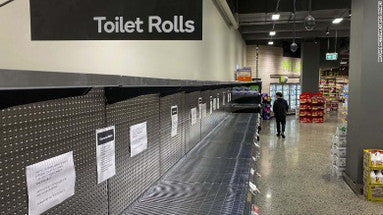The psychology behind why toilet paper, of all things, is the latest coronavirus panic buy

(CNN)Masks were the first to go. Then, hand sanitizers.
Now, novel coronavirus panic buyers are snatching up ... toilet paper?
Retailers in the US and Canada have started limiting the number of toilet paper packs customers can buy in one trip. Some supermarkets in the UK are sold out. Grocery stores in Australia have hired security guards to patrol customers.
An Australian newspaper went so far as printing eight extra pages in a recent edition -- emergency toilet paper, the newspaper said, should Aussies run out.
Why? Toilet paper does not offer special protection against the virus. It's not considered a staple of impending emergencies, like milk and bread are.
Reason 1
People resort to extremes when they hear conflicting messages
Steven Taylor is a clinical psychologist and author of "The Psychology of Pandemics," which takes a historic look at how people behave and respond to pandemics. And compared to past pandemics, the global response to the novel coronavirus has been one of widespread panic.
"On the one hand, [the response is] understandable, but on the other hand it's excessive," Taylor, a professor and clinical psychologist at the University of British Columbia, told CNN. "We can prepare without panicking."
The novel coronavirus scares people because it's new, and there's a lot about it that's still unknown. When people hear conflicting messages about the risk it poses and how seriously they should prepare for it, they tend to resort to the extreme, Taylor said.
"When people are told something dangerous is coming, but all you need to do is wash your hands, the action doesn't seem proportionate to the threat," he said. "Special danger needs special precautions."
Reason 2
Some are reacting to the lack of a clear direction from officials
Several countries have already imposed mass quarantines. People buying up toilet paper and other household supplies may be preparing for the same thing in their city, said Baruch Fischhoff, a psychologist and professor in the Department of Engineering and Public Policy and the Institute for Politics and Strategy at Carnegie Mellon University.
"Unless people have seen ... official promises that everyone will be taken care of, they are left to guess at the probability of needing the extra toilet paper, sooner rather than later," he told CNN. "The fact that there are no official promises might increase those probabilities."


